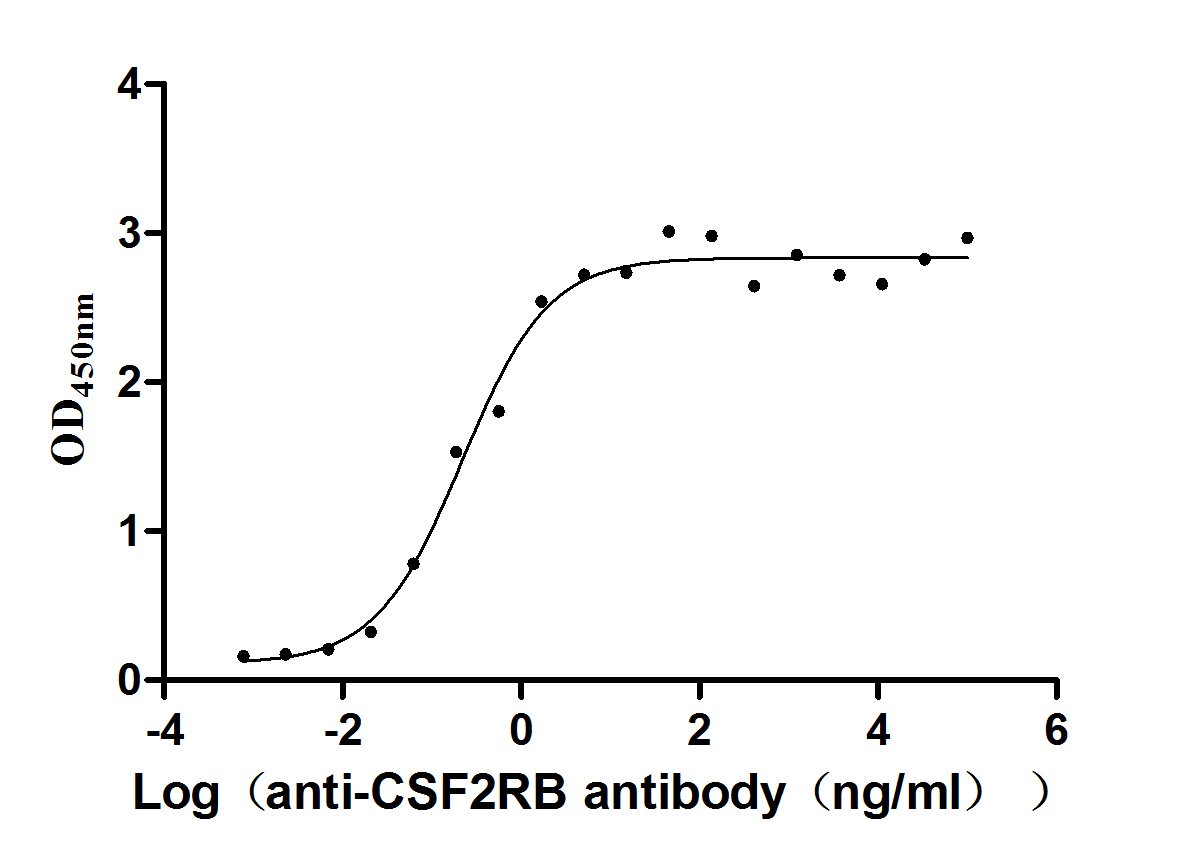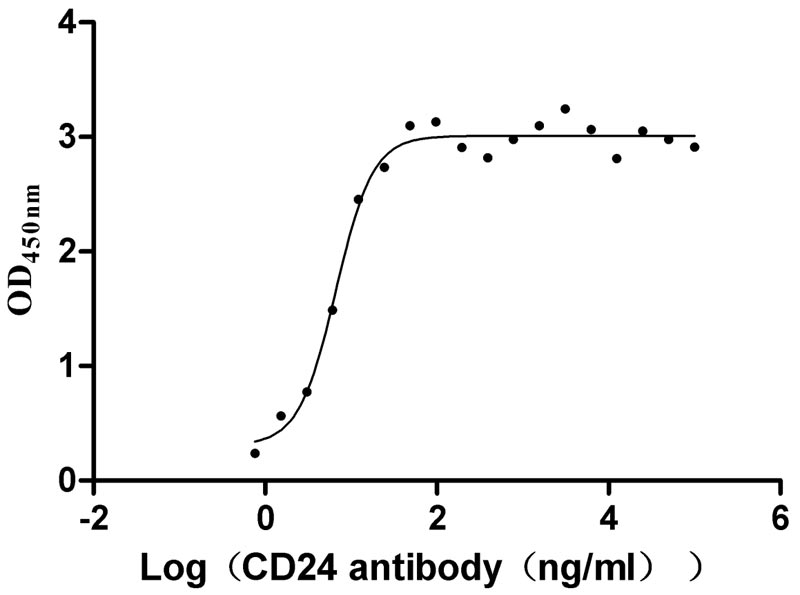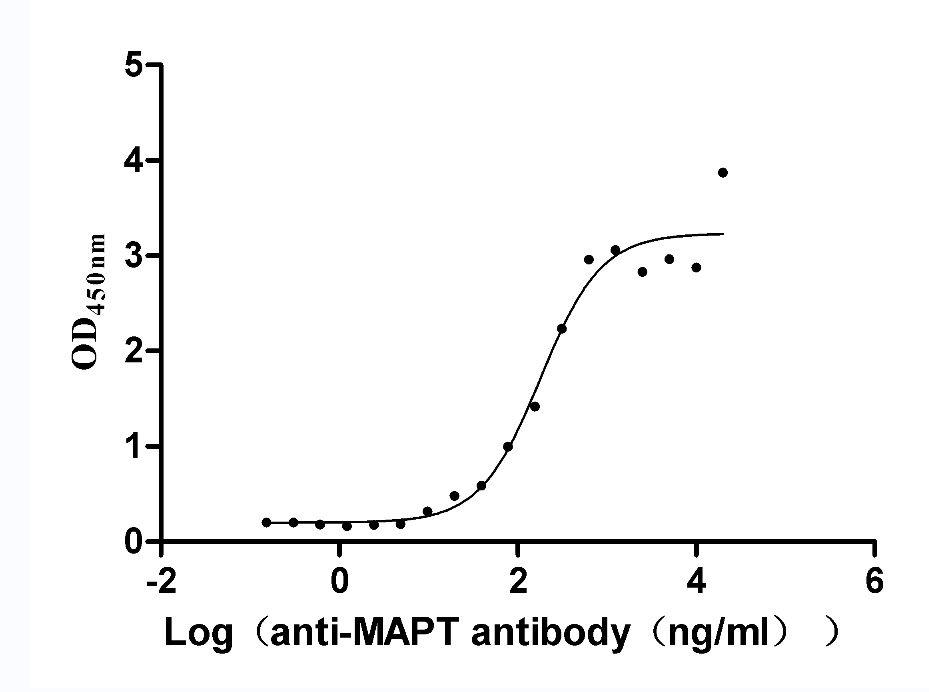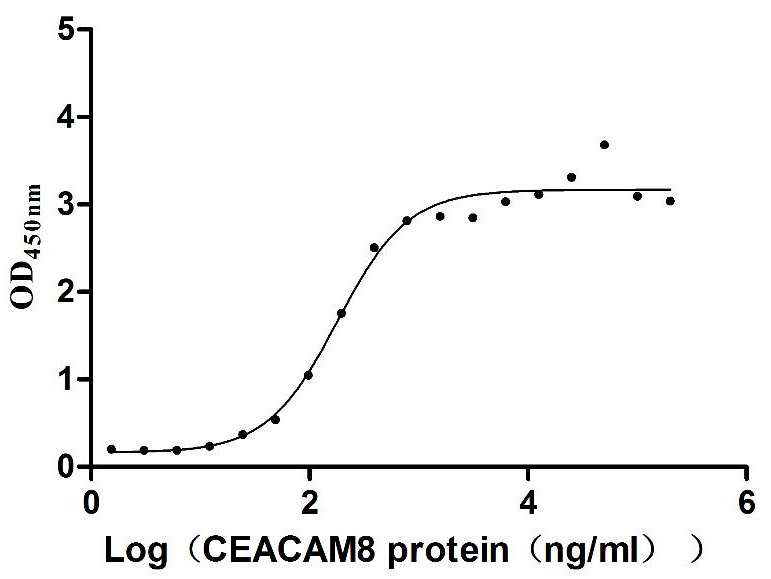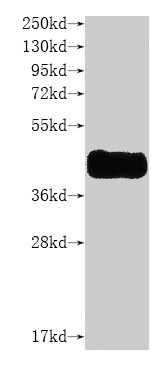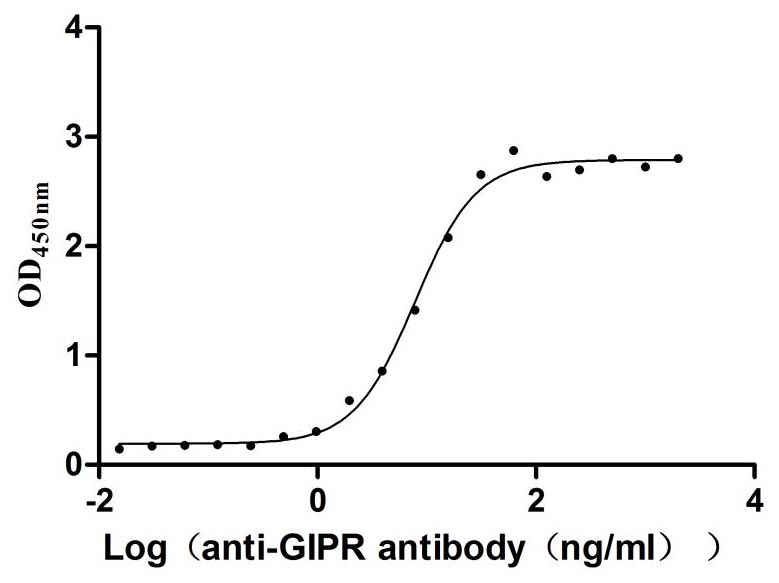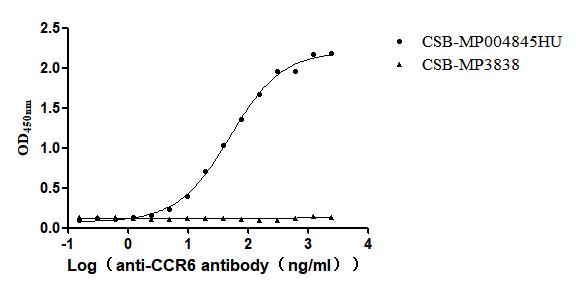Recombinant Mouse Dickkopf-related protein 1 (Dkk1)
-
货号:CSB-YP006920MO
-
规格:
-
来源:Yeast
-
其他:
-
货号:CSB-EP006920MO
-
规格:
-
来源:E.coli
-
其他:
-
货号:CSB-EP006920MO-B
-
规格:
-
来源:E.coli
-
共轭:Avi-tag Biotinylated
E. coli biotin ligase (BirA) is highly specific in covalently attaching biotin to the 15 amino acid AviTag peptide. This recombinant protein was biotinylated in vivo by AviTag-BirA technology, which method is BriA catalyzes amide linkage between the biotin and the specific lysine of the AviTag.
-
其他:
-
货号:CSB-BP006920MO
-
规格:
-
来源:Baculovirus
-
其他:
-
货号:CSB-MP006920MO
-
规格:
-
来源:Mammalian cell
-
其他:
产品详情
-
纯度:>85% (SDS-PAGE)
-
基因名:
-
Uniprot No.:
-
别名:Dkk1Dickkopf-related protein 1; Dickkopf-1; Dkk-1; mDkk-1
-
种属:Mus musculus (Mouse)
-
蛋白长度:Full Length of Mature Protein
-
表达区域:32-272
-
氨基酸序列TLNSVLINS NAIKNLPPPL GGAGGQPGSA VSVAPGVLYE GGNKYQTLDN YQPYPCAEDE ECGSDEYCSS PSRGAAGVGG VQICLACRKR RKRCMRHAMC CPGNYCKNGI CMPSDHSHFP RGEIEESIIE NLGNDHNAAA GDGYPRRTTL TSKIYHTKGQ EGSVCLRSSD CAAGLCCARH FWSKICKPVL KEGQVCTKHK RKGSHGLEIF QRCYCGEGLA CRIQKDHHQA SNSSRLHTCQ RH
-
蛋白标签:Tag type will be determined during the manufacturing process.
The tag type will be determined during production process. If you have specified tag type, please tell us and we will develop the specified tag preferentially. -
产品提供形式:Lyophilized powder
Note: We will preferentially ship the format that we have in stock, however, if you have any special requirement for the format, please remark your requirement when placing the order, we will prepare according to your demand. -
复溶:We recommend that this vial be briefly centrifuged prior to opening to bring the contents to the bottom. Please reconstitute protein in deionized sterile water to a concentration of 0.1-1.0 mg/mL.We recommend to add 5-50% of glycerol (final concentration) and aliquot for long-term storage at -20℃/-80℃. Our default final concentration of glycerol is 50%. Customers could use it as reference.
-
储存条件:Store at -20°C/-80°C upon receipt, aliquoting is necessary for mutiple use. Avoid repeated freeze-thaw cycles.
-
保质期:The shelf life is related to many factors, storage state, buffer ingredients, storage temperature and the stability of the protein itself.
Generally, the shelf life of liquid form is 6 months at -20°C/-80°C. The shelf life of lyophilized form is 12 months at -20°C/-80°C. -
货期:Delivery time may differ from different purchasing way or location, please kindly consult your local distributors for specific delivery time.Note: All of our proteins are default shipped with normal blue ice packs, if you request to ship with dry ice, please communicate with us in advance and extra fees will be charged.
-
注意事项:Repeated freezing and thawing is not recommended. Store working aliquots at 4°C for up to one week.
-
Datasheet :Please contact us to get it.
相关产品
靶点详情
-
功能:Antagonizes canonical Wnt signaling by inhibiting LRP5/6 interaction with Wnt and by forming a ternary complex with the transmembrane protein KREMEN that promotes internalization of LRP5/6. Inhibits the pro-apoptotic function of KREMEN1 in a Wnt-independent manner, and has anti-apoptotic activity. Plays a role in limb development; attenuates Wnt signaling in the developing limb to allow normal limb patterning.
-
基因功能参考文献:
- Collectively, our data strongly suggest that stress-related neurohormones, such as GCs, cause DP cells to secrete DKK1, which in turn inhibits hair growth. PMID: 28155238
- Diabetic conditions increase the expression of DKK1. PMID: 27460630
- DKK1 prevents lung metastasis of breast cancer cells but promotes breast-to-bone metastasis. PMID: 28892080
- Membrane-bound DKK-1 is a novel Foxp3 postive Treg cell derived mediator to maintain immunological tolerance in T-cell-mediated autoimmune colitis. PMID: 28556921
- Dkk1 promotes hematopoietic regeneration via direct effects on hematopoietic stem cells, decreasing the levels of mitochondrial reactive oxygen species and suppressing senescence, and via indirect effects on bone marrow endothelial cells, inducing EGF secretion. PMID: 27918563
- Recombinant Dkk1 suppresses beta-catenin target genes in myeloid-derived suppressor cells (MDSCs) from mice and humans and anti-Dkk1 loses its antitumor effects in mice lacking beta-catenin in myeloid cells or after depletion of MDSCs, demonstrating that Dkk1 directly targets MDSCs. PMID: 27045006
- Collectively, miR-9 promotes osteoblast differentiation of mesenchymal stem cells by suppressing DKK1 gene expression. PMID: 27393149
- Disturbed oscillatory flow increases DKK1 expression. DKK1 knockdown attenuates OSS-induced monocyte adhesion and endothelial impairment. Genetic silencing of DKK1 limits atherogenesis in ApoE-/- mice. PMID: 26607269
- Dickkopf1 receptor Kremen1 is a bona fide dependence receptor, triggering cell death unless bound to its ligand. PMID: 26206087
- These results suggest that inhibiting Wnt signaling in embryonic stem cells using DKK1 may promote mouse ESCs to differentiate into endoderm in vitro and in vivo PMID: 26648540
- produced by platelets, promotes Th2 polarization and pathological leukocyte infiltration PMID: 26872695
- These in vivo data support in vitro studies regarding the mechanism of HBM-causing mutations, and imply that HBM LRP5 receptors differ in their relative sensitivity to inhibition by SOST and DKK1. PMID: 25808845
- The combination of Dkk-1 overexpression by Dex and hypoxia causes the necrotic osteocytic cell death. PMID: 24819581
- platelet-derived Dickkopf-1 (Dkk1) as the major Wnt antagonist contributing to the suppression of Wnt/beta-catenin signaling in AECs during acute lung inflammation. PMID: 26351298
- thyroid hormone-induced changes in bone remodeling are associated with a divergent regulation of DKK1 and sclerostin PMID: 26218891
- OTX2 and DKK1 exhibit asymmetric expression in the anterior ventral endoderm during embryonic anterior-posterior axis formation. PMID: 25910836
- Data indicate that both Dickkopf-1 (DKK1) and sclerostin (SOST) were downregulated in proteoglycan-induced spondylitis (PGISp)-affected mouse spines. PMID: 23171658
- DKK-1 is a novel target of the mevalonate pathway that is suppressed by zoledronic acid and atorvastatin in breast cancer. PMID: 24528599
- Wnt10b/DKK1 can modulate hair follicle size during hair regeneration. PMID: 24750467
- Dkk-1-mediated inhibition of Wnt signaling in bone ameliorates osteoarthritis in mice. PMID: 25080367
- up-regulation of Dkk1 by HR contributes to abnormal development of HFs and failure in regeneration of HFs in Hr(Hp)/Hr(Hp) mice PMID: 24447645
- Overexpression of BRAF(V600E) in normal thyroid epithelial (H tori) cells also reduced the effects of Dkk-1 on cell survival. PMID: 24848709
- results indicate that Wnt signaling may mediate the profibrotic effect of PSC activation, and Wnt2/Dkk-1 could be potential therapeutic targets for CP PMID: 24747916
- Dkk1 Overexpression Inhibits Osteosarcoma Growth and Angiogenesis. PMID: 24139798
- OTX2 has a role in regulating Dkk1 and Lhx1 activity in the anterior mesendoderm PMID: 25231759
- Wnt inhibition during the first day has larger impact on the activation of Hesx1 and Six3, suggesting that in embryos Wnt inhibition caused by Dkk1, contributes greatly in the establishment of the anterior forebrain precursor. PMID: 24520934
- extra-follicular modulators Bmp2, Dkk1, and Sfrp4 increase in early anagen. PMID: 24618599
- These findings demonstrate that DKK1 and DKK2 have differential roles in normalization and functionality of tumor blood vessels, in addition to angiogenesis. PMID: 24091497
- formation of anus and urethral depends on Dkk1-mediated dynamic inhibition of the canonical Wnt/ss-catenin signal pathway. PMID: 24479159
- Dkk1 enhances endothelial-mesenchymal transition in aortic endothelial cells. PMID: 23685555
- Findings show that upregulating Wnt signaling by reducing Dkk1 expression can counteract age-related decrease in neurogenesis and its associated cognitive decline. PMID: 23395445
- DKK1 and PTEN serve as competitive endogenous RNA, affecting the expression of each other via competition for miRNAs binding in the diabetic heart. PMID: 23636253
- DKK-1 acts predominantly by inhibiting PDGF-, TGF-beta-, and connective tissue growth factor-activated MAPK and JNK signaling cascades, acting via LRP-6 with associated WNT ligand. PMID: 23302695
- Matrix rigidity activates Wnt signaling through down-regulation of Dickkopf-1 protein PMID: 23152495
- Expression of Dkk1 in chondrocytes inhibits osteoarthritic cartilage destruction. The protective effect of Dkk-1 appears to be associated with its capacity to inhibit Wnt-mediated expression of catabolic factors. PMID: 22488261
- Dkk1 misexpression in endothelial cells resulted in defects of endochondral ossification and reduced skeletal size. PMID: 22407773
- Knockdown of Dkk1 expression in BMSCs decreased their ability to promote myeloma and the associated bone disease in mice. Results show novel roles of BMSCs and BMSC-derived Dkk1 in the pathogenesis of multiple myeloma in vivo. PMID: 22374979
- Both Dkk1 and Dkk2 inhibit Wnt signaling that regulates early myocardial proliferation; each compensates for the loss of the other in that role. PMID: 20439124
- DKK-1 is involved in anagen-to-catagen transition in the hair cycle by regulating the activity of follicular keratinocytes. PMID: 22358062
- identify that mesenchymal stem cells from Prx1-Dkk1 mice have limited proliferative ability, but normal differentiation potential, which may explain the mechanism for the limb reduction defects observed PMID: 22406973
- these findings support our hypothesis that Dkk1 is a direct target of Osx. PMID: 22459449
- Dkk1 is required for midbrain dopaminergic differentiation and morphogenesis PMID: 21347250
- The negative feedback of the Wnt signaling pathway involves Dkk1 rather than Axin2. PMID: 22022411
- These data suggest that, whereas Dkk1 significantly regulates bone formation in younger animals, its role in older animals is limited to pathologies that lead to the induction of Dkk1 expression in bone and/or serum, such as traumatic injury. PMID: 21773994
- These results suggest that the Acvr1-deficiency can increase bone mass by activating Wnt signaling in which both Sost and Dkk1 expression levels are diminished. PMID: 21945937
- controls post-natal mandibular molar dentin formation either directly or indirectly via the inhibition of Wnt signaling PMID: 21917600
- miR-335-5p activates Wnt signaling and promotes osteogenic differentiation by downregulating DKK1. PMID: 21351149
- Data propose that DKK1 may play a protective role that is not unmasked by loss-of-function in the absence of other stressors. PMID: 21654186
- Quantitative real-time RT-PCR and Western blot analysis showed that the expression of DKK1 mRNA and protein in 32 ovarian serous papillary adenocarcinoma (OSC) tissues were elevated as compared with those in 10 normal ovarian tissues PMID: 21607803
- Depletion of Dkk1 induces a strong proliferative response that promotes wound repair after colitis. PMID: 21440550
显示更多
收起更多
-
亚细胞定位:Secreted.
-
蛋白家族:Dickkopf family
-
数据库链接:
KEGG: mmu:13380
STRING: 10090.ENSMUSP00000025803
UniGene: Mm.214717
Most popular with customers
-
Recombinant Human Cytokine receptor common subunit beta (CSF2RB), partial (Active)
Express system: Mammalian cell
Species: Homo sapiens (Human)
-
Recombinant Human Signal transducer CD24 (CD24)-Nanoparticle (Active)
Express system: Mammalian cell
Species: Homo sapiens (Human)
-
Recombinant Rat Microtubule-associated protein tau (Mapt) (Active)
Express system: Mammalian cell
Species: Rattus norvegicus (Rat)
-
Recombinant Human Carcinoembryonic antigen-related cell adhesion molecule 6 (CEACAM6) (Active)
Express system: Mammalian cell
Species: Homo sapiens (Human)
-
Recombinant Human C-C chemokine receptor type 8 (CCR8)-VLPs (Active)
Express system: Mammalian cell
Species: Homo sapiens (Human)
-
Recombinant Rat Gastric inhibitory polypeptide receptor (Gipr), partial (Active)
Express system: Mammalian cell
Species: Rattus norvegicus (Rat)
-
Recombinant Human Myosin regulatory light chain 12A (MYL12A) (Active)
Express system: E.coli
Species: Homo sapiens (Human)
-
Recombinant Human C-C chemokine receptor type 6(CCR6)-VLPs (Active)
Express system: Mammalian cell
Species: Homo sapiens (Human)


